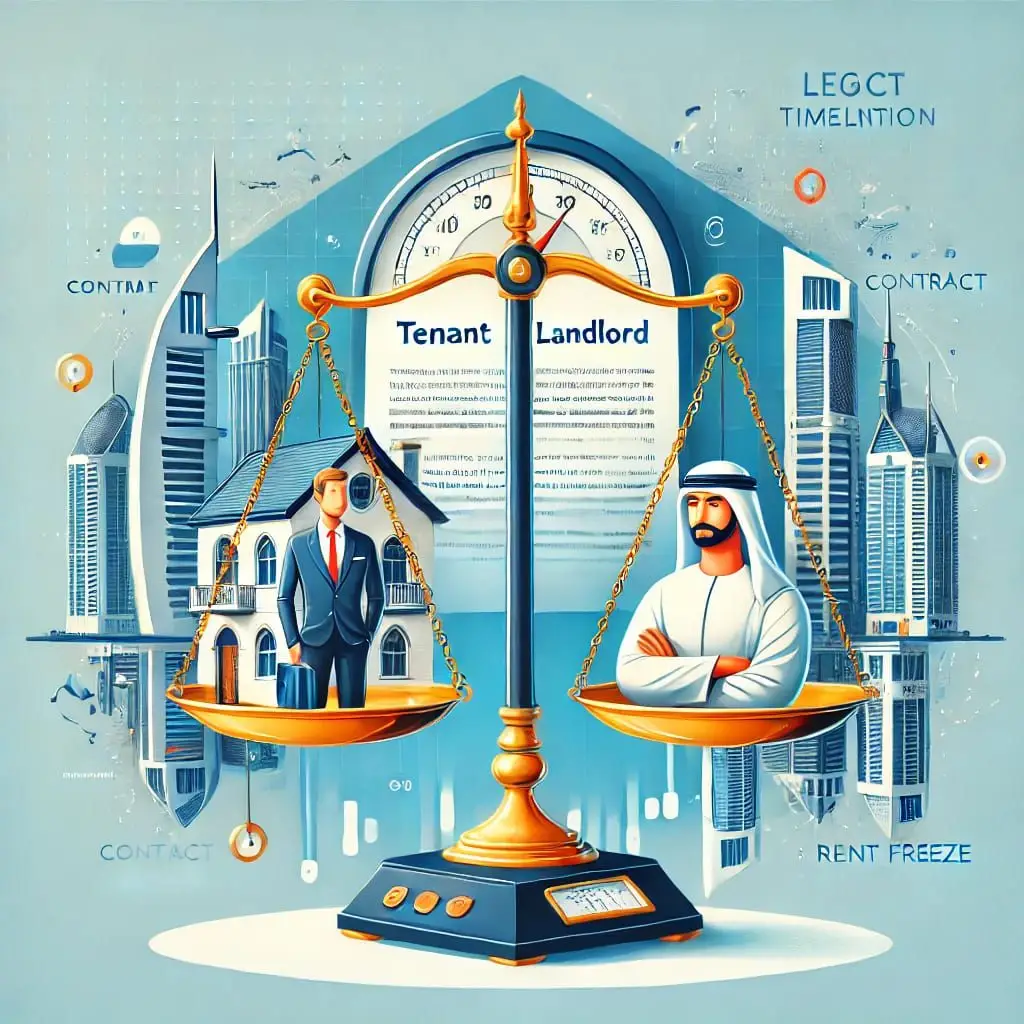
Introduction
Sharjah, the cultural capital of the United Arab Emirates, has taken a significant step towards modernizing its real estate sector with the introduction of Law No. 5 of 2024. This groundbreaking legislation, known as the New Sharjah Rental Law, aims to create a more balanced and transparent rental market in the emirate. In this comprehensive guide, we’ll delve into the intricacies of the law, exploring its impact on both tenants and landlords, and what it means for the future of Sharjah’s property market.
The Genesis of Sharjah’s New Rental Law
Historical Context
Prior to the introduction of Law No. 5 of 2024, Sharjah’s rental market was governed by older regulations that many considered outdated in the face of rapid urban development and changing demographic needs. The new law represents a response to these evolving dynamics and aligns Sharjah’s rental practices more closely with international standards.
Key Objectives of the New Law
- Enhance tenant protection
- Clarify landlord responsibilities
- Establish fair and transparent rental practices
- Streamline dispute resolution processes
- Promote long-term stability in the rental market
Detailed Analysis of Key Provisions
1. Contract Ratification and Registration
Mandatory Registration
- All rental agreements must be officially registered with the Sharjah Municipality
- Deadline: Within 15 days of contract issuance
Implications of Non-Compliance
- Unregistered contracts are not legally recognized
- Government entities will not process transactions related to unregistered leases
- Tenants can seek judicial intervention to enforce registration
2. Rent Control and Increase Regulations
Initial Rent Freeze Period
- Duration: First three years of the rental agreement
- Applies to: Both new and renewed contracts
Subsequent Rent Adjustments
- After the freeze period, increases must align with the “fair rent value”
- Fair rent value to be determined by yet-to-be-published executive regulations
- Anticipated factors: Property location, size, amenities, and market conditions
Tenant Protections
- If a rent increase is agreed upon during the freeze period, a two-year moratorium on further increases applies
- Landlords must provide 90 days’ notice for any proposed rent increase
3. Eviction Protocols and Tenant Rights
Protected Tenancy Periods
- Residential properties: 3 years
- Commercial and industrial properties: 5 years
Legitimate Grounds for Eviction
- Landlord’s intent to personally occupy the property
- Property requires extensive renovations or demolition
- Tenant’s failure to pay rent for more than 30 days after receiving formal notice
- Tenant’s use of property for illegal purposes
- Subletting without landlord’s written consent
Eviction Notice Requirements
- Minimum 90 days’ notice through notary public or registered mail
- Notice must specify legitimate grounds for eviction
Compensation for Wrongful Eviction
- Tenants can claim damages if evicted without valid reason
- Compensation may include relocation costs and difference in rent for a similar property
4. The Rental Disputes Centre (RDC): A New Era in Conflict Resolution
Establishment and Jurisdiction
- Newly created body under Sharjah Municipality
- Exclusive jurisdiction over rental disputes in the emirate
Key Responsibilities
- Mediation of disputes between landlords and tenants
- Issuance of binding decisions on rental conflicts
- Enforcement of judgments related to rental issues
Types of Disputes Handled
- Rent arrears and bounced checks
- Maintenance disagreements
- Early termination conflicts
- Security deposit refunds
- Eviction proceedings
Process and Timeframes
- Filing a complaint: Can be done online or in-person
- Initial mediation: Attempt to resolve dispute amicably
- Formal hearing: If mediation fails, within 15 days of complaint
- Decision issuance: Within 30 days of hearing
- Appeal process: 15 days to appeal RDC decisions to Sharjah courts
5. Maintenance and Property Upkeep
Landlord Responsibilities
- Ensure property is in habitable condition
- Conduct major repairs and maintain structural integrity
- Address issues affecting tenant’s use of property within specified timeframes
Tenant Rights
- Request necessary repairs in writing
- Deduct repair costs from rent if landlord fails to address issues within 30 days
- Terminate lease without penalty if property becomes uninhabitable due to landlord neglect
Annual Maintenance Allowance
- Landlords may include a maintenance allowance in the contract
- Cannot exceed 5% of annual rent
- Must be clearly stipulated in the rental agreement
6. Security Deposits and Refunds
Maximum Deposit Amount
- Residential properties: Up to 5% of annual rent
- Commercial properties: Up to 10% of annual rent
Refund Process
- Landlord must refund deposit within 30 days of lease termination
- Deductions allowed for unpaid rent, utility bills, or property damage beyond normal wear and tear
- Itemized list of deductions must be provided to tenant
Dispute Resolution
- Tenants can file a complaint with RDC if deposit is not refunded or if deductions are disputed
Impact on Sharjah’s Real Estate Market
Short-term Effects
- Potential slowdown in new lease agreements as market adapts
- Increased demand for legal and property management services
- Surge in contract registrations and updates to comply with new law
Long-term Projections
- More stable and predictable rental market
- Increased investor confidence in Sharjah’s real estate sector
- Potential for sustainable growth in property values
- Enhanced quality of rental properties due to clearer maintenance standards
Preparing for the New Rental Landscape
For Tenants
- Review existing lease agreements for compliance with new law
- Familiarize yourself with new rights and protections
- Keep detailed records of all communications with landlords
- Consider seeking legal advice for complex situations
For Landlords
- Update rental agreements to align with new regulations
- Implement systems for timely contract registration and maintenance responses
- Review and adjust long-term investment strategies
- Consider professional property management services to ensure compliance
Conclusion: A New Chapter in Sharjah’s Real Estate Story
The New Sharjah Rental Law of 2024 marks a pivotal moment in the emirate’s approach to property leasing. By establishing clearer rights and responsibilities for both tenants and landlords, the law aims to create a more equitable and efficient rental market. As Sharjah continues to grow as a hub for business and culture in the UAE, this progressive legislation positions the emirate as a leader in modern, tenant-friendly real estate practices.
While the full impact of the law will unfold in the coming years, one thing is clear: stakeholders in Sharjah’s rental market must stay informed and adaptable. By embracing these changes, tenants can enjoy greater security and fairness, while landlords can benefit from a more stable and attractive investment environment.
FAQs About Sharjah’s New Rental Law
- When did the New Sharjah Rental Law come into effect?
Law No. 5 of 2024 was enacted in 2024, with immediate effect on all new and existing rental agreements in Sharjah. - How often can landlords increase rent under the new law?
Landlords cannot increase rent for the first three years of a new rental agreement. After this period, increases must align with the “fair rent value” as determined by executive regulations. - What is the Rental Disputes Centre (RDC)?
The RDC is a newly established body under Sharjah Municipality designed to efficiently oversee and resolve rental disputes through mediation and binding decisions. - Can tenants be evicted before their lease term ends?
Eviction is restricted for the first three years of residential leases and five years for commercial leases, except under specific circumstances outlined in the law. - How does the new law protect tenants from unfair eviction?
Tenants can claim compensation for damages if they are wrongfully evicted, including relocation costs and rent differentials for similar properties. - What should I do if my current lease doesn’t comply with the new law?
Both tenants and landlords should review their existing agreements and make necessary amendments to ensure compliance. Seeking legal advice may be beneficial in complex cases. - How will the “fair rent value” be determined for rent increases?
The exact mechanism for determining fair rent value will be outlined in forthcoming executive regulations, likely considering factors such as property location, size, amenities, and current market conditions. - Can landlords refuse to renew a lease after the protected period?
After the protected period (3 years for residential, 5 years for commercial), landlords can choose not to renew a lease but must provide proper notice and have legitimate grounds as specified in the law.
Stay informed about Sharjah’s evolving rental market. For personalized legal advice regarding the New Sharjah Rental Law, consult with a qualified legal professional.


